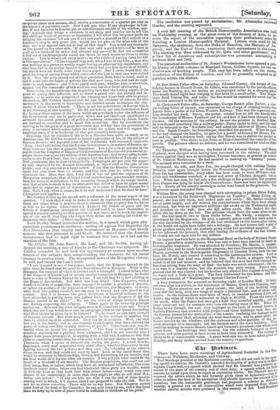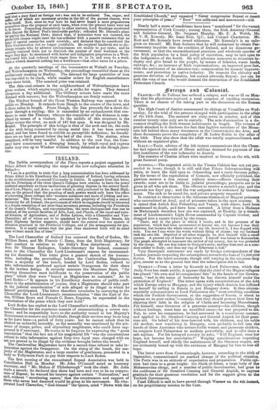'Ube Vrobiaces.
There have been more meetings of Agricultural Societies in the Pro- vinces—at Waltham, Rochester, and Conway.
Earl Stanhope presided at the Rochester meeting, and did not omit in his s ogee. ing ing speech to criticize Mr. Disraeli amended declaration of policy made in ,fieet- ingbam Castle hall,—a speech which showed that Mr. Disraeli was perfeetly.A. norant 6f the state of the country and of their duty; a speech which for these reasons he called upon them to reject as containing advice. Mr. Disraeli had n?t renewed the advice which he had formerly given them at Aylesbury—that order to relieve the land of its necessities they should increase the amount of its taxation; but the honourable gentleman had proposed a scheme as absurd-- namely, a general tax on all commodities which were imported from abroad' whether similar articles were produced in this country or not. Lord Stephle held that a duty fixed on foreign core was not to be endured. Tea, sugar, and coffee, all of which are necessary articles in the life of the poorest classes, were W he taxed. Now, since he was born he had never heard a more preposterous proposition than the proposal of such taxeswhen even the present taxes were not to be borne. Proceeding discursively to other matters, Lord Stanhope mentioned with disgust Sir Robert Peel's intolerable perfidy; ridiculed Mr. Disraeli's plans for pling the National Debt; hinted that, if protection were not restored, the productive classes might meet the tax-collector with a passive resistance that no army of special constables could override; and declared that be considered the Tithe Commutation Act no longer justifiable. He conjured landlords not to dis- charge tenants who by adverse circumstances are unable to pay rents; and he sacredly conjured them not to diminish the number of their workmen or the wages they pay: he mentioned with horror and indignation proprietors is a West- ern county who had reduced their wages from Sr. to 7s. and even 6s. a week. sorb a wretch deserved nothing but a workhouse—that other name for a prison.
At the quarterly meetings of the ironmasters at Walsall on Tuesday, and Wolverhampton on Wednesday, the proceedings resembled those at the preliminary meeting in Dudley. The demand for large quantities of iron was reported to be slack, while smaller orders for English manufactures were more brisk. The nominal price was retained.
The thin-coal-miners in the neighbourhood of Wolverhampton have given notices, which expire tonight, of a strike for wages. They demand ninepence a day additional. The Oldbury miners have made the same demand with success; but the Wolverhampton are firmly resisted.
The Windsor branch of the Great Western Railway was opened to the public on Monday. It extends from Slough to the centre of the town, and is three miles in length. From Slough, the line proceeds for a short dis- tance through a cutting; this is succeeded by an embankment that con- tinues to near the Thames; whence the remainder of the distance is com- pleted by means of a viaduct. In the middle of this structure is the bridge across the river, an arch of 187 feet span. It was designed by Mr. Brunel. The principle of this bridge is that of the arch and tie, the ends of the arch being connected by strong metal ties: it has been severely tested, and has been found to exhibit no perceptible deflection; its founda- tions are on hard gravel below the bed of the river. The station, when completed, will be very tasteful. In addition to the new line, the Com- pany have constructed a diverging branch, by which royal and express trains may run up to Windsor without being detained at the Slough junc- tion.



























 Previous page
Previous page